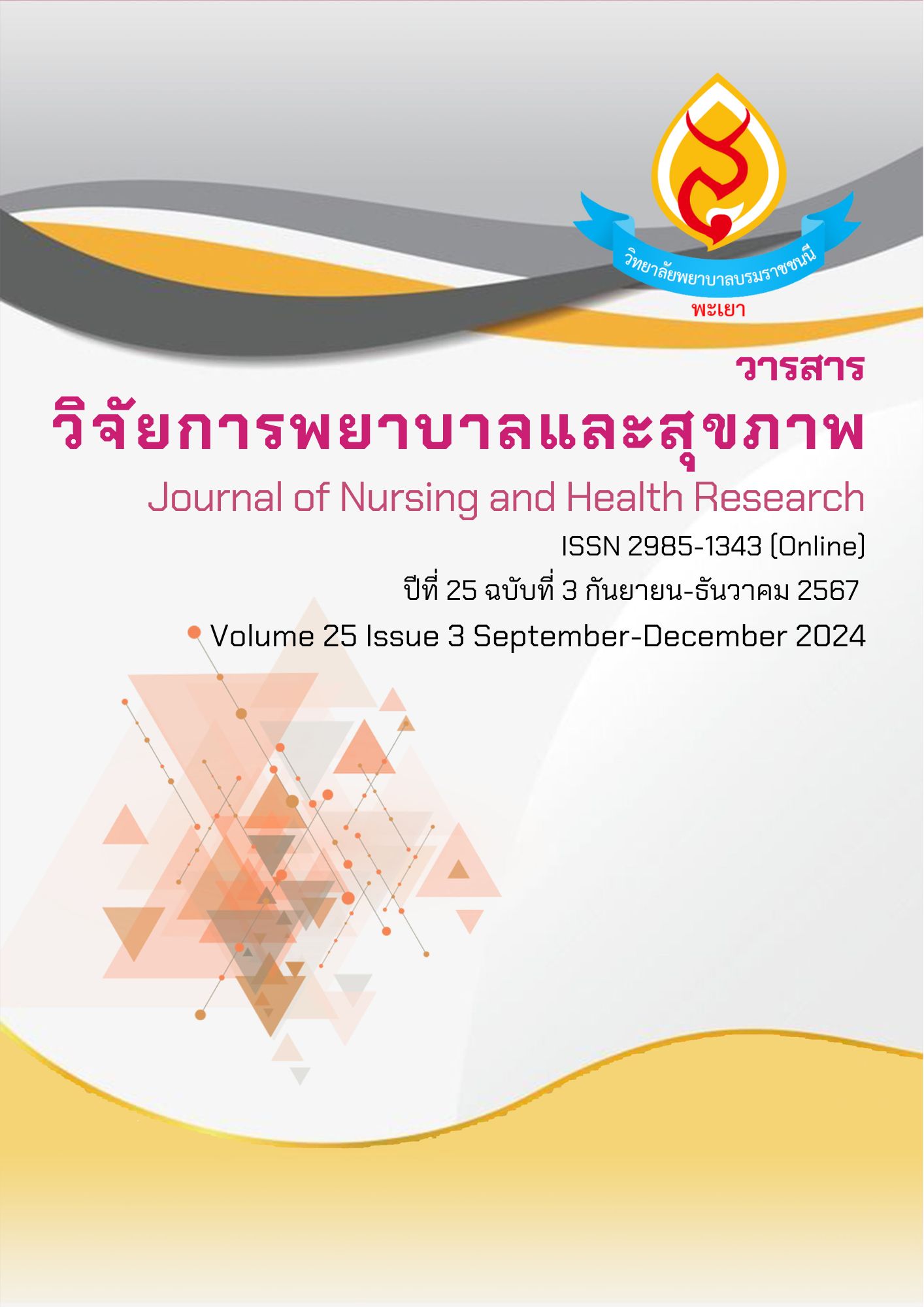ความคาดหวังของผู้มีส่วนได้ส่วนเสียต่อสมรรถนะของผู้บริหารการพยาบาล ในยุค 5.0
คำสำคัญ:
ความคาดหวังของผู้มีส่วนได้ส่วนเสีย, สมรรถนะ, ผู้บริหารการพยาบาลบทคัดย่อ
ปัจจุบันมีการเปลี่ยนแปลงอย่างรวดเร็วและมีความซับซ้อนของเทคโนโลยี นโยบาย โครงสร้างการบริหาร และความคาดหวังของผู้รับบริการ ส่งผลให้การบริหารทางการพยาบาลต้องปรับตัวเพื่อตอบสนองต่อการเปลี่ยนแปลง โดยเฉพาะระบบบริการสุขภาพในยุค 5.0 ที่ต้องเผชิญกับการเปลี่ยนแปลงอย่างพลิกผัน ของเทคโนโลยีดิจิทัล ปัญญาประดิษฐ์ การแพทย์ทางไกล นโยบายการกระจายอำนาจสู่ท้องถิ่น และความคาดหวังของผู้รับบริการที่เพิ่มขึ้น การวิจัยเชิงคุณภาพนี้มีวัตถุประสงค์เพื่อศึกษาความคาดหวังสมรรถนะของผู้บริหารการพยาบาลในยุค 5.0 ตามการรับรู้ของผู้มีส่วนได้ส่วนเสีย ผู้ให้ข้อมูลประกอบด้วย ผู้ใช้บัณฑิตในสถานบริการระดับ ตติยภูมิ ทุติยภูมิ และปฐมภูมิ ผู้แทนจากองค์กรวิชาชีพ ผู้บริหารสังกัดองค์การบริหารส่วนท้องถิ่น ผู้บริหารการพยาบาลภาคเอกชนและนอกสังกัดกระทรวงสาธารณสุข ผู้บริหารสถาบันการศึกษาพยาบาล รวมทั้งสิ้น จำนวน 58 ราย โดยคัดเลือกผู้ให้ข้อมูลแบบเจาะจง เครื่องมือที่ใช้คือ แบบสัมภาษณ์เชิงลึก และแบบบันทึกการสนทนากลุ่ม วิเคราะห์ข้อมูลด้วยการวิเคราะห์แก่นสาระ ผลการวิจัย พบว่า สมรรถนะที่คาดหวังของผู้บริหารการพยาบาลในยุค 5.0 เป็นส่วนสำคัญในการตอบสนองต่อการเปลี่ยนแปลงที่รวดเร็ว โดยสมรรถนะที่สำคัญ 9 สมรรถนะ ประกอบด้วย 1) สมรรถนะด้านภาวะผู้นำและการจัดการการเปลี่ยนแปลง 2) สมรรถนะการบริหารและการจัดการเชิงกลยุทธ์ 3) สมรรถนะด้านเทคโนโลยีดิจิทัลและการบริหารข้อมูล 4) สมรรถนะด้านการบริหารจัดการเชิงระบบและเครือข่าย 5) สมรรถนะด้านการจัดการเชิงธุรกิจและความยั่งยืน 6) สมรรถนะด้านการพัฒนาทีมและการทำงานร่วมกัน 7) สมรรถนะด้านคุณธรรม จริยธรรม และการบริหารตามหลักธรรมาภิบาล 8) สมรรถนะด้านความคิดเชิงวิสัยทัศน์และความยืดหยุ่น และ 9) สมรรถนะด้านการวิจัย และการพัฒนาองค์ความรู้ และการสร้างนวัตกรรม ซึ่งสมรรถนะทั้งหมดนี้ มีบทบาทสำคัญในการตอบสนองต่อความท้าทายใหม่ ๆ และส่งเสริมความสำเร็จอย่างยั่งยืนในยุค 5.0
เอกสารอ้างอิง
Allen, C. G., Barbero, C., Shantharam, S., & Moeti, R. (2019). Is theory guiding our work? A scoping review on the use of implementation theories, frameworks, and models to bring community health workers into health care settings. Journal of Public Health Management and Practice, 25(6), 571-580. https://doi.org/10.1097/phh.0000000000000846
Broome, M. E., & Marshall, E. S. (2020). Transformational leadership in nursing from expert clinician to influential leader (3thed.). Springer Publishing
Burgess, J., & Honey, M. (2022). nurse leaders enabling nurses to adopt digital health: Results of an Integrative literature review. Nursing Praxis in Aotearoa New Zealand, 38(3). https://doi.org/10.36951/001c.40333
Cara-Lynn S., Annika V., Kothai K. & Subhajit C. (2023). Exploring the impact of decentralized leadership on knowledge sharing and work hindrance networks in healthcare teams. Journal of Management & Organization, 29, 139–158. https://doi.org/10.1017/jmo.2020.37
Carroll, A. B., & Shabana, K. M. (2010). The business case for corporate social responsibility: A review of concepts, research, and practice. International Journal of Management Reviews, 12(1), 85-105. https://doi.org/10.1111/j.1468-2370.2009.00275.x
Chinlumprasert, N. (2021). Vision and leadership of nurses in leveraging the strategic direction of global healthcare. Thai Journal of Nursing, 70(2), 62-71. (in Thai)
Frilund, M., Fagerstrøm, L., & Vasset, F. (2023). The challenges of change processes for nurse leaders-a qualitative study of long-term leaders' experiences over 25 years. Nursing open, 10(8), 5423–5432. https://doi.org/10.1002/nop2.1781
Kaplan, R. S., & Norton, D. P. (2004). Strategy maps: Converting intangible assets into tangible outcomes. Harvard Business School Press.
Klunklin, A. & Uppor, W. (2021). Professional nurses and entrepreneurship in the 21st century. The Journal of Chulabhorn Royal Academy, 3(1), 8-18. (in Thai)
Kotter, J. P. (2012). Leading Change. Harvard Business Review Press.
Lincoln Y.S., & Guba E.G. (1988). Criteria for assessing naturalistic inquiries as reports.
McGonigle, D., & Mastrian, K. (2024). Nursing informatics and the foundation of knowledge (6th ed.). Jones & Bartlett Learning
Ministry of Public Health. (2022). Health Operational Plan 2023-2027. Nonthaburi: Ministry of Public Health. (in Thai)
Office of the National Economic and Social Development Council. (2022). The thirteenth national economic and social development plan (2023-2027). Office of the National Economic and Social Development Council. https://www.nesdc.go.th/nesdb_en/main.php?filename=develop_issue (in Thai)
Rodríguez-García, M. C., Márquez-Hernández, V. V., Belmonte-García, T., Gutiérrez-Puertas, L., & Granados-Gámez, G. (2020). Original research: How magnet hospital status affects nurses, patients, and organizations: A systematic review. AJN American Journal of Nursing, 120(7), 28–38. https://doi.org/10.1097/01.naj.0000681648.48249.16
Ruechai, S. & Aungsuroch, Y. (2015). Nursing directors’ competencies, private hospitals accredited by joint commission international. Journal of Nursing Science Chulalongkorn University. 27(3), 130-145. (in Thai)
Sindhu. (2023, April 18). What do nursing administration professionals need to know about data analytics? WPUNJ. https://online.wpunj.edu/degrees/healthcare/msn/nursing-administration/nursing-administration-professionals-data-analytics/
Singchungchai, P. (2019). Innovative leadership in nursing management. The Southern College Network Journal of Nursing and Public Health, 6(1), 260-267. (in Thai)
Srijukkot, J., & Krairiksh, M. (2022). A synthesis of nursing leadership literature from thesis of the master of nursing science program in nursing administration, Faculty of Nursing, Khon Kaen University. Journal of Nursing Science and Health, 45(4), 5–17. (in Thai)
TH Reis da Silva. (2024). Navigating healthcare complexity: Integrating business fundamentals into nursing leadership. In Sedky, A. (Eds.). Resiliency Strategies for Long-Term Business Success (pp.145-168). IGI Global Scientific. https://doi.org/10.4018/979-8-3693-9168-6.ch006
Thailand Nursing and Midwifery Council. (2018). Core competencies of graduates with bachelor’s degree, master’s degree, doctoral degree in nursing science, advanced nursing training courses at the diploma level and receiving a certificate/approval letter. Demonstrate knowledge and expertise in nursing and midwifery and nursing specialties in the field of nursing science. Thailand Nursing and Midwifery Council. https://www.tnmc.or.th/images/userfiles/files/112.pdf (in Thai)
Van Manen, M. (1990). Researching lived experience: human science for an action sensitive pedagogy. Suny Press.
Wiggins, N., Johnson, S., & Maes, K. (2021). Engaging community health workers in evidence-based practices. American Journal of Public Health, 111(3), 404-410. https://doi.org/10.2105/AJPH.2020.306042
Wong, C. A., Cummings, G. G., & Ducharme, L. (2013). The relationship between nursing leadership and patient outcomes: a systematic review update. Journal of Nursing Management, 21(5), 709–724. https://doi.org/10.1111/jonm.12116
ดาวน์โหลด
เผยแพร่แล้ว
รูปแบบการอ้างอิง
ฉบับ
ประเภทบทความ
สัญญาอนุญาต
ลิขสิทธิ์ (c) 2024 วารสารวิจัยการพยาบาลและสุขภาพ

อนุญาตภายใต้เงื่อนไข Creative Commons Attribution-NonCommercial-NoDerivatives 4.0 International License.



